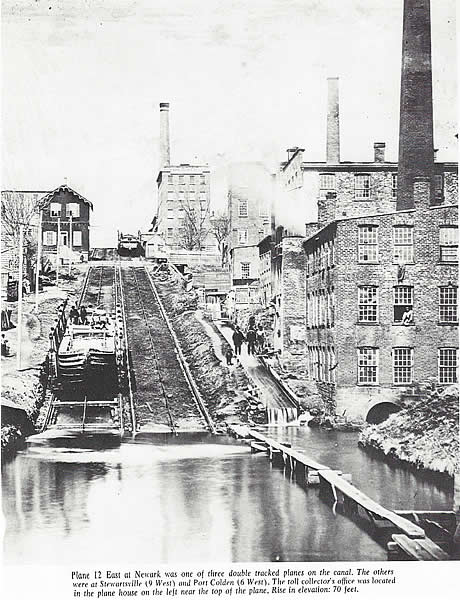Morris Canal
Photos
Do you have a photo of this waterway?
If so please email
me.
Construction began - 1825
First Use - 1829
Completed - 1832
Closed - 1924
Canal
Society of New Jersey
Morris
Canal in Newark by Laura Gonzalez
Lock 16 East - Lock Street Lock
Inclined Plane 12 East - High Street to Plane Street
Lock 17 East - North & South Canal Street at Railroad Place
Lock
Lock 18 East - Railroad & Passaic River
Lock 19 East - Ferry Street/Plank Road & Railroad
Lock 20 East - Passacic River
|

Photo from The Morris Canal by James
Lee |
Newspaper Articles
August 7, 1881 - A
Narrow Escape
September 4, 1881 - A
Heavy Team Plunges into the Canal
April 16, 1882 - The
Inclined Plane
March 18, 1883 - The
Morris Canal
March 22, 1885 - Purifying
the Canal
August 30, 1885 - Horses
Frightened by the Cable of the Inclined Plane
January 10, 1886 - Morris Canal Business
April 22, 1900 - The
Reversionary Rights in the Morris Canal and the Company's Lakes
March 22, 1903 - The
Morris Canal - The Great New Jersey Waterway as It Used to be
May 24, 1903 - Rescued
from the Canal
June 5, 1904 - Boy
Drowned in Canal
December 17, 1905 - Discussed
the Canal Question
January 28, 1906 - Morris
Canal is Useless Commercially Under Present Conditions of Neglect
February 11, 1906 - Railroad
Scheming Strangled Industry of the Morris Canal
September 13, 1908 - Newark
Fishing Banks by Canal Side Part 1
September 13, 1908 - Newark
Fishing Banks by Canal Side Part 2
June 26, 1910 - Canoeing
on the Canal, From Newark to Lake Hopatcong
January 28, 1912 - Make
Canal Parkway
February 4, 1912 - Canal
Abandonment
March 17, 1912 - Bed
of the Morris Canal as a Trolley Car Route
October 27, 1912 - Canal
Investigators Have Hearing This Week
From "A History of the City of Newark"
Lewis Historical Publishing Company
The Morris Canal was a powerful factor in promoting Newark's prosperity
and in stimulating street and road development. The agitation for its
construction began in the early 1820's. In 1824 the Legislature authorized
the building of the canal from the Delaware, near Easton, to the Passaic,
near the present city of that name. The canal company was empowered to
raise $1,000,000 in capital stock and to increase this by half a million,
if this sum should be found necessary to complete the work. In 1828 the
canal company was authorized to extend the canal to Jersey City. The enterprise
was not fully financed until 1830, when a loan of $5,200,00 was assured
from capitalists in Holland. This sum offered was more than five times
that asked for. As a consequence, the canal stock immediately jumped to
eighty-five points above par. The "ditch" was completed from
the Delaware to Newark (the route as it approached this section having
been diverted from the Acquackanonck region) in 1832, and immediately
put in operation.
The actual cost of the canal, from Phillipsburg to Newark, was about
$2,000,000, instead of $817,000, as originally estimated. The first boat
to reach tide waters was the Walk in the Water with a consignment to Stephens
& Condit. This was on the 19th or 20th day of May, 1832.
|
